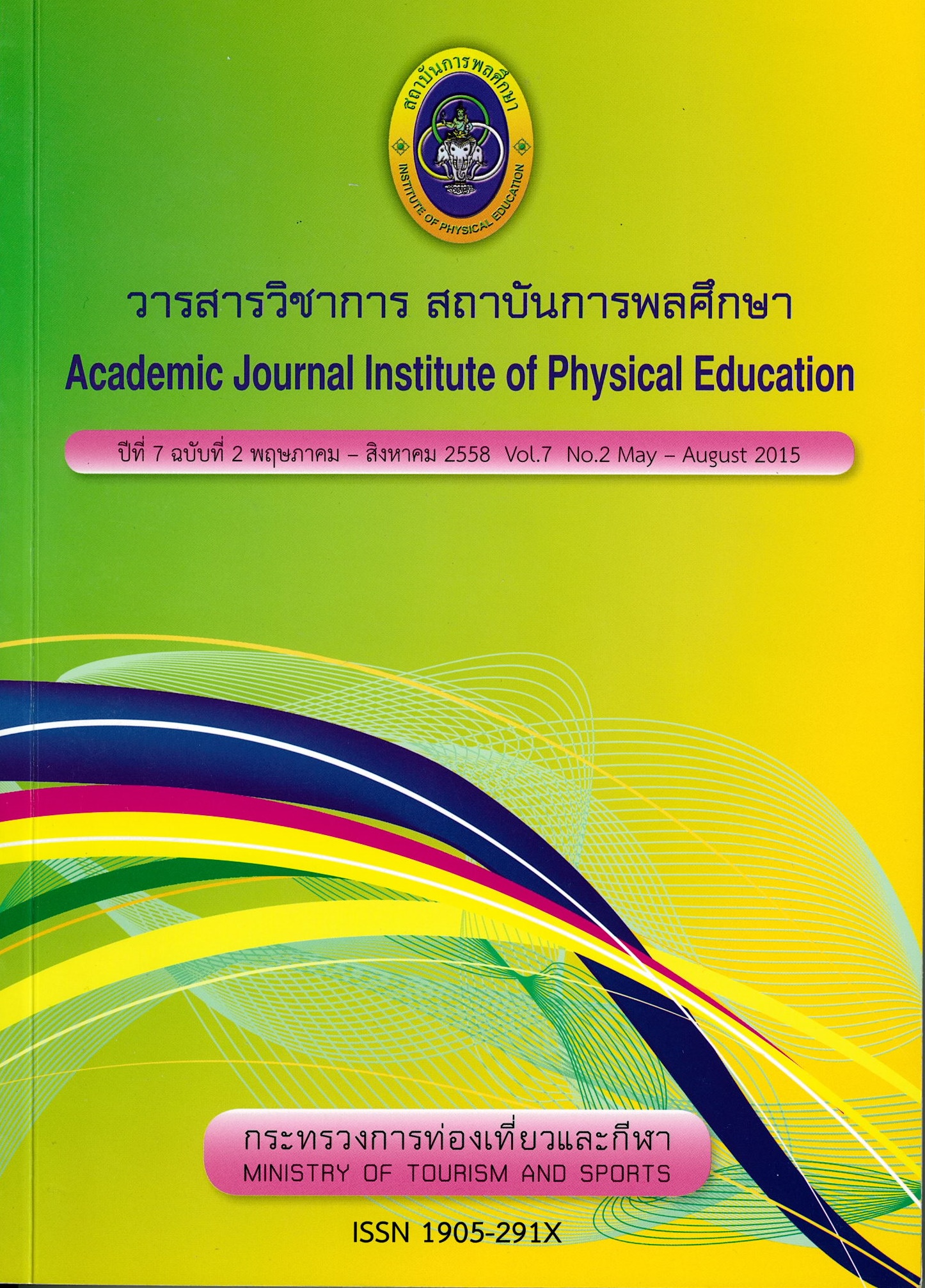The Relationship between Coaching Behaviors and Success in Male Competition of Table Tennis, The Central Interscholastic Competition of Department of Physical Education in The Year of 2556
Main Article Content
Abstract
The purpose of this research was to study and analyze the relationship between coaching behavior and the accomplished outcome of table tennis male youth player under the aged of 13-14, 15-16, and 17-18 year old who joined the table tennis 2013 which was organized by the department of Physical Education on December 9-12, 2013. The interviewed questionnaires were used to collect data about coach behavior and result record of table tennis competition as well as the accomplished outcome of each table tennis youth player. The data were analyzed in statistic by finding percentages, mean and standard deviation of each item. The data were analyzed to determine pearson correlation coefficient at significant level .05 .The result were described below: 1. The relationship between coaching behavior and success by the expectation of table tennis youth players. The coaching behavior on philosophy of coach emphasized on Athlete first, winning second, which was associated at high level with players in high success group. The coaching behavior on coaching approach way emphasized on game approach way by coach was associated at moderated level with players in high success
- The coaching behavior on coaching style emphasized on cooperative style was
associated at moderate level with players in high success group. 2. The relationship between coaching behavior and success outcome of table tennis youth players. The coaching behavior on philosophy of coach emphasized on Athlete first, winning second, which was associated at moderate level with players in high success group. The coaching
r on coaching approach way emphasized on game approach way by coach was
associated at moderated level with players in high success group. The coaching behavior on coaching style emphasized on cooperative style was associated at high level with players in high success group.
Article Details

This work is licensed under a Creative Commons Attribution-NonCommercial-NoDerivatives 4.0 International License.
The published article is a copyright of the Academic Journal of Thailand National Sports University. The passage appeared in each article in this academic journal is a perspective of each author which is not related to the journal. Each author is required to be responsible for all components of his/her own article. If there are any mistakes, each author must be responsible for those mistakes on his/her own.
References
Borton. (1992). The jekylVHyde nature of goal. Champaign: Human Kinetics.
Chelladurai, P. (1990). Leadership in sport.
McCloskey, M. J. (1999). Successful sport coaching: Childhood Education.
Rainer Martens. (1981). Coaching Young Athletes. Ilinois: Human Kinetics.
Rainer Martens. (2004). Successful Coaching. United State: USA: Human Kinetics.
Smoll, F. L., and Hunt, E ,. (1977). A system for the behavioral assessment of athletic coaches: Research Quarterly.
วิกิพีเดีย. (2555). นันทนา คําวงศ์. http://th.m.wikipedia.org/wiki/
วิชาการ.คอม. (2010), สาเหตุการบาดเจ็บทางกีฬา. http://www.vcharkarn.com/rss/article/
วิเชียร เกตุสิงห์. (2538), ค่าเฉลี่ยกับการแปลความหมาย : เรื่องง่ายๆ ที่บางครั้งก็ผิดพลาดได้, fromข่าวสารการวิจัย htt://library.uru.ac.th/article/htmlfile/1803382.htm
สรุปผลการแข่งขัน. (2009), คอลัมน์ซีเกมส์2009. from Siamsprt www.siamsport.coth
สืบสาย บุญวีรบุตร. (2541), จิตวิทยาการกีฬา, ชลบรี: ชลบุรีการพิมพ์,
สุกรีย์ รักษ์ศรีทอง. (2530). การพัฒนาเยาวชนนอกโรงเรียน เพื่อความมั่นคงของชาติ: รัฏฐาภิรักษ์.
สุชา จันทร์เอม และสุรางค์ จันทร์เอม. (2531) จิตวิทยาวัยรุ่น. พระนครฯ:สํานักพิมพ์ วัชรินทร์การพิมพ์.
สุพิตร สมาหิโต. (2535), จิตวิทยาการกีฬา แนวคิด ทฤษฎี สู่การปฏิบัติ, กรุงเทพฯ : สํานักพิมพ์จุฬาลงกรณ์มหาวิทยาลัย


